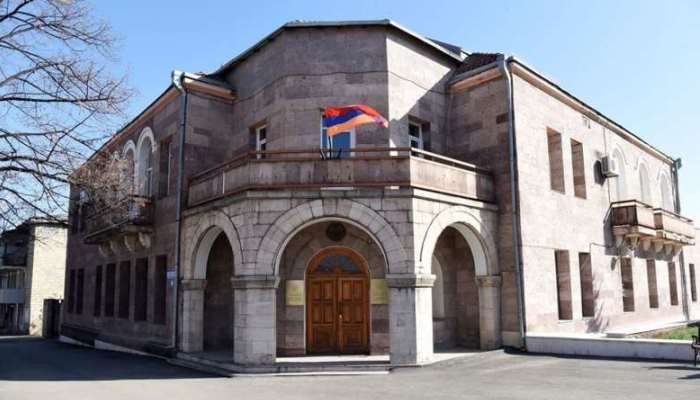Comment on the Press Statement Made by the Russian Foreign Minister Following the Trilateral Meeting in Moscow
 In connection with the press statement made by the Russian Foreign Minister following the trilateral talks with the Foreign Ministers of Armenia and Azerbaijan, which took place on 25 July 2023, we consider it necessary to state the following. The Republic of Artsakh highly appreciates the long-standing mediation efforts of the Russian Federation, both in a national capacity and as an OSCE Minsk Group Co-Chair. We are grateful to Russia for its exceptional contribution to putting an end to the 44-day aggression of Azerbaijan and for its peacekeeping mission in Artsakh. We took note that during the meeting, the Russian side presented its assessment of measures that need to be taken promptly and without delay to provide the population of Artsakh with food, medicines and other essentials, and ensure uninterrupted electricity and gas supply. While not questioning Russia's commitment to helping the parties find a long-term settlement to the Azerbaijan-Karabakh conflict and facilitate the normalisation of relations between Armenia and Azerbaijan, we believe it is necessary to note that the vision of dialogue between Stepanakert and Baku proposed by the Russian side is not balanced. The statement that there is a need for dialogue to agree on the rights arising from international obligations, including conventions on the protection of the rights of national minorities, reflects the viewpoint of only one party - Azerbaijan. Such an approach predetermines the outcome of any potential dialogue and thereby undermines and devalues its meaning. The assertion that the Azerbaijan-Karabakh conflict is a problem of ensuring the rights of a national minority is a false narrative promoted by Azerbaijan with the aim of distorting the essence of the conflict and justifying the denial of the right of the people of Artsakh to self-determination, a fundamental principle of international law, which the Russian Federation itself has invoked many times. Attempts to find a solution to the Azerbaijan-Karabakh conflict based on the logic of safeguarding the rights of national minorities are detached from reality and cannot lead to a fair, balanced and dignified peace. Against the backdrop of Azerbaijan's blatant non-compliance with the provisions of the Trilateral Statement of 9 November 2020, and its international obligation to implement legally binding decisions of the International Court of Justice, observe the norms of international humanitarian law and eliminate all forms of racial discrimination, claims suggesting that Azerbaijan will voluntarily adhere to any mechanisms are devoid of any basis. Attempts to impose such a vision of conflict resolution are fraught with catastrophic consequences. As regards the remark that the most sensitive issue of the negotiations "remains the problem of guarantees for the rights and security of the Armenians of Nagorno-Karabakh in the context of ensuring the territorial integrity of Azerbaijan in full accordance with the 1991 Declaration signed by the leaders of the former Soviet republics in Alma-Ata", we consider it appropriate to recall again that by the time of signing this document, the Republic of Artsakh had completed the process of seceding from the Azerbaijan SSR in compliance with the legislation of the Soviet Union and the norms of international law. Furthermore, the Alma-Ata Declaration, like any international document, should be guided by the purposes and principles of the UN Charter and other universally accepted norms and principles of international law. Therefore, the Alma-Ata Declaration contains the same principles and norms as the UN Charter, including the right to self-determination. However, the interpretation of the relationship between different legal norms is subject to the overall logic of the development of international law and international practice. In this regard, we consider it necessary to emphasise that the right to secession, based on the principle of self-determination of peoples, prevails over the principle of territorial integrity of states in cases of massive serious human rights violations and discriminatory policies. This formula, in particular, is described in the Declaration on Principles of International Law concerning Friendly Relations and Co-operation among States, which has been repeatedly invoked by the Russian Foreign Minister. We express our consent with the interpretation repeatedly provided by the Russian side regarding the relationship between the principles of the right to self-determination and territorial integrity. This approach has also been established in the judicial practices of various countries. We strongly urge the international actors that in settling the Azerbaijan-Karabakh conflict they are guided solely by the principles of international law and the interests of people who for nearly 8 months have been on the verge of a humanitarian catastrophe, as well as under the growing threat of ethnic cleansing. |

«A landmark moment for our nations’ partnership»: The White House
52109.02.2026, 19:04
Trump wants new, improved nuclear arms treaty as New START expires
88106.02.2026, 00:00
The Government of Armenia is working with WHO to organize the treatment of dozens of children from Gaza in the hospitals of Armenia
41002.02.2026, 11:39
Rubio says territorial issue over Donetsk yet to be bridged between Russia, Ukraine
82928.01.2026, 23:00
The Assembly regrets the excessive polarisation and stigmatisation of political opponents by all sides in Armenia
68026.01.2026, 21:12
Ararat Mirzoyan will be on a working visit to Strasbourg
55826.01.2026, 12:08
